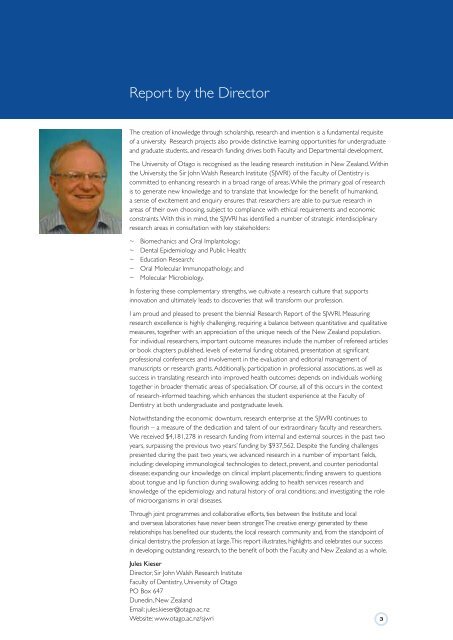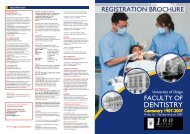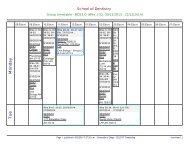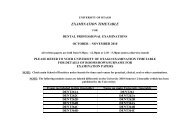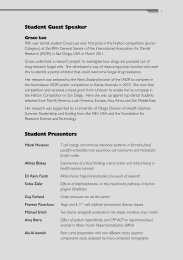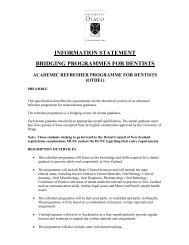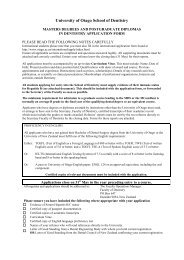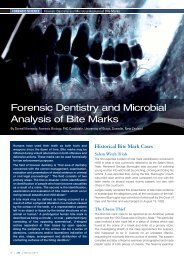2OO9 – 2O1O - Faculty of Dentistry - University of Otago
2OO9 – 2O1O - Faculty of Dentistry - University of Otago
2OO9 – 2O1O - Faculty of Dentistry - University of Otago
Create successful ePaper yourself
Turn your PDF publications into a flip-book with our unique Google optimized e-Paper software.
Report by the Director<br />
The creation <strong>of</strong> knowledge through scholarship, research and invention is a fundamental requisite<br />
<strong>of</strong> a university. Research projects also provide distinctive learning opportunities for undergraduate<br />
and graduate students, and research funding drives both <strong>Faculty</strong> and Departmental development.<br />
The <strong>University</strong> <strong>of</strong> <strong>Otago</strong> is recognised as the leading research institution in New Zealand. Within<br />
the <strong>University</strong>, the Sir John Walsh Research Institute (SJWRI) <strong>of</strong> the <strong>Faculty</strong> <strong>of</strong> <strong>Dentistry</strong> is<br />
committed to enhancing research in a broad range <strong>of</strong> areas. While the primary goal <strong>of</strong> research<br />
is to generate new knowledge and to translate that knowledge for the benefit <strong>of</strong> humankind,<br />
a sense <strong>of</strong> excitement and enquiry ensures that researchers are able to pursue research in<br />
areas <strong>of</strong> their own choosing, subject to compliance with ethical requirements and economic<br />
constraints. With this in mind, the SJWRI has identified a number <strong>of</strong> strategic interdisciplinary<br />
research areas in consultation with key stakeholders:<br />
~ Biomechanics and Oral Implantology;<br />
~ Dental Epidemiology and Public Health;<br />
~ Education Research;<br />
~ Oral Molecular Immunopathology; and<br />
~ Molecular Microbiology.<br />
In fostering these complementary strengths, we cultivate a research culture that supports<br />
innovation and ultimately leads to discoveries that will transform our pr<strong>of</strong>ession.<br />
I am proud and pleased to present the biennial Research Report <strong>of</strong> the SJWRI. Measuring<br />
research excellence is highly challenging, requiring a balance between quantitative and qualitative<br />
measures, together with an appreciation <strong>of</strong> the unique needs <strong>of</strong> the New Zealand population.<br />
For individual researchers, important outcome measures include the number <strong>of</strong> refereed articles<br />
or book chapters published, levels <strong>of</strong> external funding obtained, presentation at significant<br />
pr<strong>of</strong>essional conferences and involvement in the evaluation and editorial management <strong>of</strong><br />
manuscripts or research grants. Additionally, participation in pr<strong>of</strong>essional associations, as well as<br />
success in translating research into improved health outcomes depends on individuals working<br />
together in broader thematic areas <strong>of</strong> specialisation. Of course, all <strong>of</strong> this occurs in the context<br />
<strong>of</strong> research-informed teaching, which enhances the student experience at the <strong>Faculty</strong> <strong>of</strong><br />
<strong>Dentistry</strong> at both undergraduate and postgraduate levels.<br />
Notwithstanding the economic downturn, research enterprise at the SJWRI continues to<br />
flourish <strong>–</strong> a measure <strong>of</strong> the dedication and talent <strong>of</strong> our extraordinary faculty and researchers.<br />
We received $4,181,278 in research funding from internal and external sources in the past two<br />
years, surpassing the previous two years’ funding by $937,562. Despite the funding challenges<br />
presented during the past two years, we advanced research in a number <strong>of</strong> important fields,<br />
including: developing immunological technologies to detect, prevent, and counter periodontal<br />
disease; expanding our knowledge on clinical implant placements; finding answers to questions<br />
about tongue and lip function during swallowing; adding to health services research and<br />
knowledge <strong>of</strong> the epidemiology and natural history <strong>of</strong> oral conditions; and investigating the role<br />
<strong>of</strong> microorganisms in oral diseases.<br />
Through joint programmes and collaborative efforts, ties between the Institute and local<br />
and overseas laboratories have never been stronger. The creative energy generated by these<br />
relationships has benefited our students, the local research community and, from the standpoint <strong>of</strong><br />
clinical dentistry, the pr<strong>of</strong>ession at large. This report illustrates, highlights and celebrates our success<br />
in developing outstanding research, to the benefit <strong>of</strong> both the <strong>Faculty</strong> and New Zealand as a whole.<br />
Jules Kieser<br />
Director, Sir John Walsh Research Institute<br />
<strong>Faculty</strong> <strong>of</strong> <strong>Dentistry</strong>, <strong>University</strong> <strong>of</strong> <strong>Otago</strong><br />
PO Box 647<br />
Dunedin, New Zealand<br />
Email: jules.kieser@otago.ac.nz<br />
Website: www.otago.ac.nz/sjwri<br />
3


